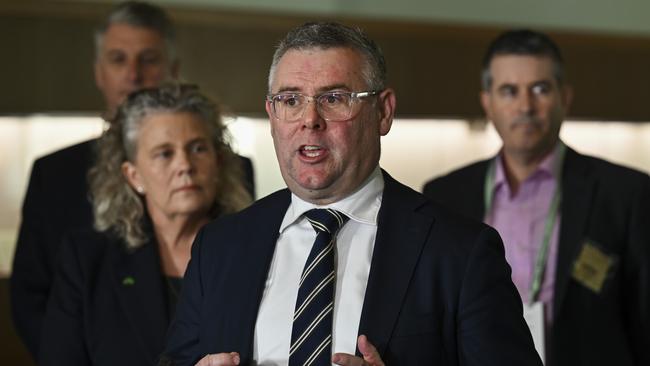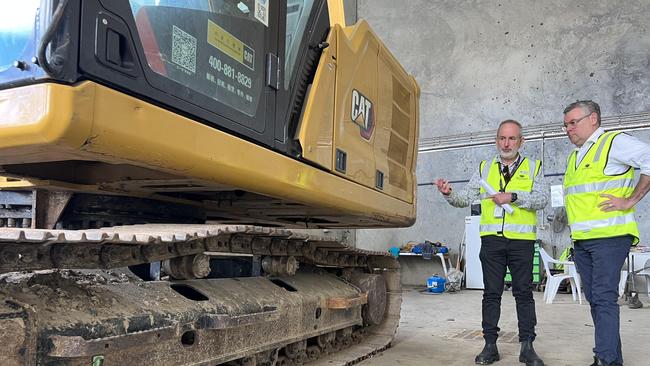Federal government is working on a container levy to help protect Australia from biosecurity threats
Agriculture Minister Murray Watt has revealed the government is working on a long-awaited container levy to aid the nation’s biosecurity.
A long-awaited container levy is firmly in the federal government’s sights, with Agriculture Minister Murray Watt revealing that lawyers are working to create a watertight policy that would successfully navigate any potential legal challenges by international trading partners.
The news would be welcomed by an agriculture industry that has called for the introduction of a sea-freight import charge for several years, and still digesting the introduction of a “modest” biosecurity protection levy on farmers in Tuesday’s federal budget.
Mr Watt told The Weekly Times that the government was having “a serious look” at introducing a container levy and is currently working though trade law issues.
“What we do not want to do is introduce a new container levy that ends up being legally challenged and cannot stand up in court,” Mr Watt said.
“You will remember the last government had an attempt at introducing something like this and had to walk away from it, so we want to do the work properly before we introduce something and be confident that it can stand up legally.

“But I do think that it is fair to explore those kinds of levies and, once we have done that work, it may well lead to an import levy, or a container levy, down the track.”
A container surcharge was a centrepiece policy of the previous Coalition government and projected to raise $325 million over three years to help create a sustainable biosecurity funding model.
However, the legislation was never introduced and the plan abandoned in 2020 after a path to introduce the levy could not be found.
Under the new funding model introduced this week, farmers will contribute $47.5 million, or 6 per cent, of the total $804 million biosecurity spend from 2024-25 via a 10 per cent levy on all products.
Mr Watt said the biosecurity protection levy from July next year was part of a potential two-step shared funding biosecurity model – that will collect even more significant contributions from importers and taxpayers – while a container charge is worked on.
National Farmers’ Federation president Fiona Simson on Tuesday night said it was “extremely disappointing” that a producer levy was announced in the federal budget instead of a broadbased container levy “that forced risk creators to underwrite the system”.
She also pointed out that farmers were already a significant contributor to the biosecurity system, including research and development costs, marketing, funding traceability systems and meeting the cost of outbreaks.
Mr Watt said the reaction from lobby groups was as expected but that people recognised this was “a massive investment” in biosecurity.
“Once you take them through who will pay what, I think people can appreciate that we are not asking a huge amount from farmers in terms of that levy and they can see where we are coming from,” he said.
“I think it is a fair ask of producers, if we are going to be asking the shopkeeper in Ballarat or the school cleaner in Wangaratta to pay a little bit more through their taxes, I think it is only fair to ask producers as big beneficiaries of the biosecurity system to chip in a little bit as well.”
TALKS THAW CHINA TRADE BANS
A complicating issue for the immediate introduction of a container levy is that the federal government is working to repair relations with the nation’s largest trading partner, China.
Mr Watt said a key consideration of the evolution of Labor’s container levy was the “optics” of what China might see as a new tariff imposed on its exporters.
“It is partly the optics of it, but it is also the legal ramifications and just as we from time-to-time challenge other countries at the WTO (World Trade Organisation) about effectively unfair tariffs that they impose on us, what we don’t want to do is create a situation where some new levy that we introduce can be challenged as well,” Mr Watt said.
“I want to have some certainty around the charges that we are imposing and that is why we are getting on with increasing charges on importers are legally sound, while we continue to do the work in exploring a container levy as well.”
Meanwhile, Trade Minister Don Farrell will become the first Australian trade minister to visit China since 2019 when he arrives in Beijing on Thursday, on a mission to negotiate a full kickstart of exports to China of barley, wine and other key commodities that are currently locked up in hard and soft trade bans.
Mr Farrell said in a statement that the trip was about “advocating strongly for the full resumption of unimpeded Australian exports to China – for all sectors – to the benefit of both countries and in the interests of Australian exporters and producers,”
More Coverage





